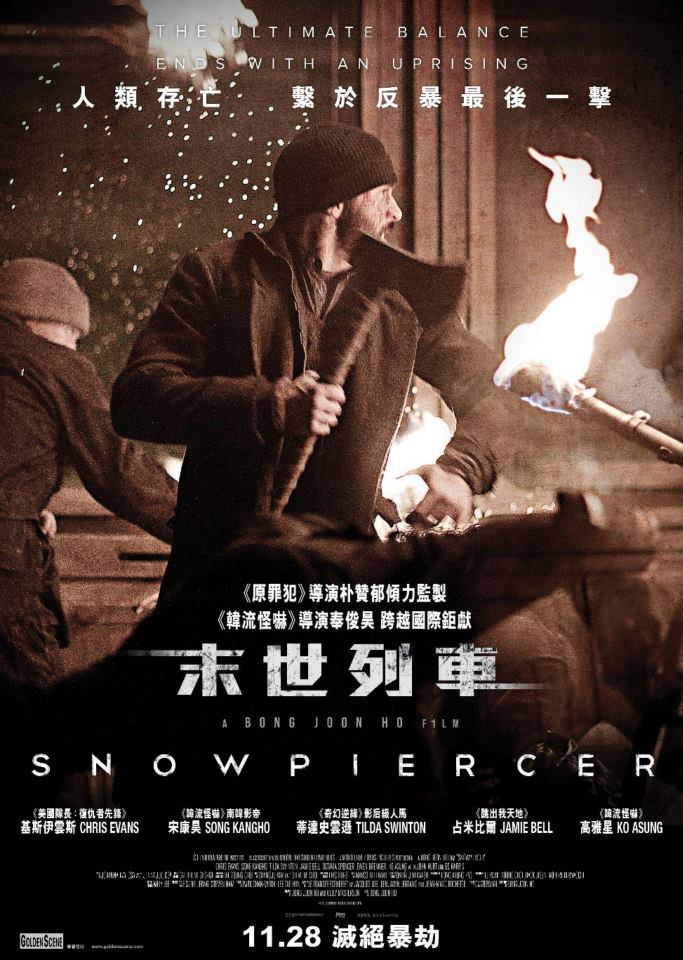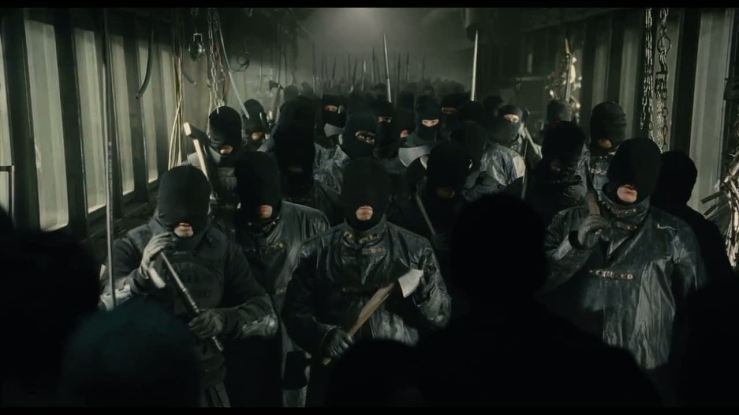
1. Snowpiercer, 2013, directed by Bong Joon Ho and produced by Park Chan Wook, is a sci-fi dystopian set on a mega-train, where the vestiges of humanity survive, protected from the new ice age outside. The plot involves the third-class passengers’ revolt against the elites who enjoy a privileged life at the head of the train. Etc.
2. You’ve seen this movie before, read this book before. You’ve played this video game.
3. Metropolis, Soylent Green, 12 Monkeys, Half-Life 2, The Time Machine, the MaddAddam trilogy, Children of Men, BioShock, Zardoz, Logan’s Run, Brave New World, Brazil, The City of Lost Children, Bad Dudes, Die Hard, The Polar Express, etc.
4. Points 2 and 3 are lazy writing, and Snowpiercer deserves better. Although the film is not especially original, it does have a clear point of view, its own aesthetics, and an engaging, energetic rhythm, powered by strong (if purposefully cartoonish) performances from its cast.
5. Snowpiercer is essentially structured like a video game. The heroes, a rebel alliance led by Chris Evans (Captain America, looking like The Edge from U2 for half the film), clear each train car—each game board—before moving on to the next challenge. An early standout scene involves a fight with a band of ninjas who for some reason ritually slaughter a fish before battle (the scene echoes the famous hammer hallway fight in Old Boy, a film directed by Snowpiercer producer Chan Wook Park).

6. The simple narrative structure of Snowpiercer allows the filmmakers to highlight the plot’s allegorical dimension. Highlight is the wrong verb: What I mean to say is hammer. Snowpiercer is not especially subtle in its critique of capitalism, with the engine that powers the train as a metaphor for capitalism itself—the engine determines the form of the train which in turn shapes the form of the society that must live in the train.
7. At Jacobin, Peter Frase offers a strong argument that the film challenges the entire system of capitalism and ultimately advocates transcendence of the system—not internal revolution.
8. While I think Frase’s essay offers a compelling analysis, I think that he simply wants the film to be better than it is. Snowpiercer, despite an apparent subversive streak, is still a Hollywoodish spectacle of violence and noise. It cannot transcend its own tropes (it can’t even revolutionize them). The vision of transcendence it offers is a rhetorical trick; not only that, it’s a stale trick, one that we can find at the end of any number of dystopian fictions: The exit door, the escape hatch, the way out.
9. I want to talk about that exit door—the end of the film: so major spoilers ahead.
10. I see the final act of Snowpiercer as a succession of climaxes, beginning with rebel leader Curtis’s monologue, delivered to security expert Namgoong Minsu (Song Kang Ho). The monologue stands out for a few reasons—it’s the longest sustained speech by any character in the film, and it’s not illustrated by any additional shots of action/flashback—it’s just Curtis’s pained face as he describes the first weeks on the train, when he and many of the other third-class passengers — “men with knives” — murdered victims out of hunger. “Babies taste best,” he whimpers, underlining the film’s theme of apocalyptic infanticide. Curtis tells Nam/the audience that this infanticidal violence was suspended when future rebel leader Gilliam (John Hurt) sacrificed his own arm, giving it up to be eaten in the place of a sacrificial baby. The example is soon followed by others, but Curtis is unable to give up one of his limbs—yet. His sacrifice must take place at the end of the film, when he gives up his arm to save a child. The film’s moral vision here is of a sacrificial economy—a tacitly Jesusian one—where the hero gives life to the Other at the cost of his own body.
11.So self-sacrifice: That’s one exit—and one that we’ve seen repeatedly (in film, art, narrative, etc.) as the ultimate telos of heroism.
12. The other exit is created by Namgoong: He opens a door to the outside. He doesn’t live though: He can’t survive the sacrificial economy of Snowpiercer. He exchanges his life so that his daughter Yona (Go Ah Sung), just as Curtis exchanges his life so that Timmy may live. I’ve neglected to introduce these characters to the riff, but c’mon, you’ve seen the film if you’re reading this far, right? Anyway, they are The Survivors—they exit the train, clad in furs and holding hands. They see a polar bear. The end.
13. The ending of the film invites two fairly straightforward interpretations, both of which suggest a post-utopian future. The first interpretation is that Timmy and Yona are Adam and Eve. They will live and humanity will live. The polar bear signals survival and life and the ability to thrive and all that jazz. The second interpretation is that Timmy and Yona are done, finish, over—polar bear food. They have no training and are quite literally unequipped to survive. Humanity perishes.
15. Of course, the director doesn’t get to choose how the viewer imagines what happens next—and what happens next is what’s really important here. Snowpiercer doesn’t offer a solution to the problems of our own global dystopia of income inequality and impending ecological collapse (and it’s a film so c’mon, why should it?). But it does open a door and carve out a small space for us to imagine a future outside the engine.
16. (Snowpiercer’s biggest shortcoming is its inability to imagine a new kind of filmmaking).
17. What happens next? I hope the kids live.

Very good summation.
Saw it two days ago, and I’m still noodling it through. Interesting idea for a film, humanity on a train. I kind of liked it visually, although I thought it was a a stab at a Terry Gilliam ‘look’, but no one does dystopia like Terry, nobody…
Loved Tilda.
All fell apart in the last 15 minutes for me. What was the message? If the huddled masses were ever in charge (even for a minute) it would be the end of civilization, and maybe humanity? Preexisting order, indeed…
LikeLike
I think the film has a revolutionary idea at its core: our current system cannot be fixed, any stabs at revolting will only be absorbed into the system, so to hell with the system, run it off the rails and let’s start all over. That seems pretty radical to me. I never would have thought that an idea like this would be thought of as banal or mundane, which you seem to think it is. Snowpiercer has more to say about our current predicament than Pikett’s book, which is so utopian and preposterous as to be a work of fiction. The fact that Pikett’s book is mildly successful and fashionable and this film has been almost completely buried speaks volumes, to me, at least, what it is the more important work.
LikeLike
*Piketty
LikeLike
Given that the “back” (i.e. what I imagine you think represents the working class) does no work at all, and the “front” (which I guess you think represents the capitalist class) does all productive work, including manual labor…how is Snowpiercer a critique of capitalism? Even if one were to accept the analogy (and I don’t, it doesn’t fit well), the working class literally ends humanity on a stupid hunch fueled by ressentiment. Surely that is not an indictment of capitalism, but the lower classes!
A far better fit is religion. Note the CONSTANT references to the divinity of the engine. The explicit comparison of the train to the world; the passengers to humanity as a whole. The constant references to people’s preordained positions in the train. Think predestination, catholicism vs calvinism. And of course the utterly religious rituals worshiping Wilford!
The back have to suffer for the same reason that evil has to exist. And as we see in the ending, the evil is not a choice. It is _necessary_ evil, for the very existence of the human race. As Wilford convincingly argues, his actions are necessary for balance. But then we see the ghost in the machine! This is an evil that God can perpetrate…but when man tries to take over, he doesn’t have the strength (or thinks it’s not worth it). Evil IS necessary for the world to continue to turn, and the price is too high: these people are not worth saving. And so he condemns the human race
Also note the parallel between the ending of the film and the CW7 incident: it’s essentially the same thing.
LikeLike
So…Mean Dad in the Sky is the antagonist here? I didn’t feel the hint of a trace of a shadow of the metaphysical to the film, beyond its Jesus riff (Captain Curtis’s monologue) and the Eden gag at the end—and even then, there’s nothing more than a shell there–no real evocation of spirituality, let alone a critique of its existence.
LikeLike
Oh and one more thing: there is no ambiguity to the end. Even if the kids somehow miraculously manage to live in that frozen wasteland, humanity will be done after a few generations of inbreeding.
LikeLike
You know it’s a movie, right, Anon?
LikeLike
Reblogged this on The Roots of Nimloth and commented:
Świetna produkcja. Można jej zarzucić kilka pomniejszych wad, ale całość broni się znakomicie. Dobre podejście do niepokojącej utopii w stylu Bioshock.
LikeLike